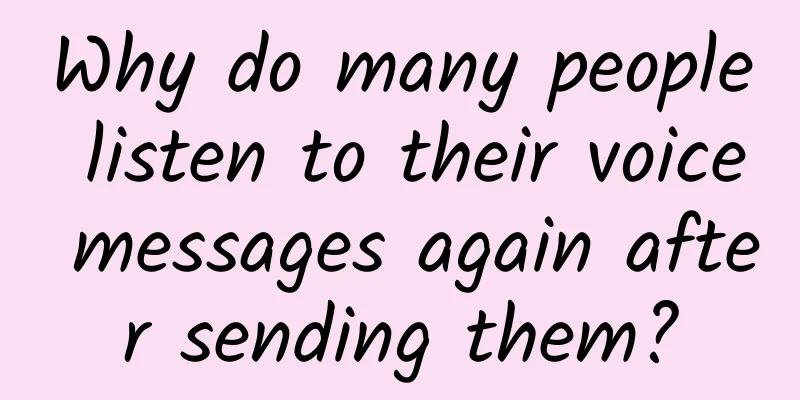Why do many people listen to their voice messages again after sending them?

|
Have you noticed that many people around you will listen to their WeChat voice messages again after sending them? Even if they are just chatting with friends, they will click to listen to it again. Why is this so? Let’s talk about it from a psychological perspective today. Always listening to the voice message again after sending it is a process of self-verification Not everyone will listen to a voice message again after sending it. It only happens to people with certain characteristics or motivations. There are actually some psychological factors at work behind this. Social psychologist Swan proposed a self-verification theory, which believes that people tend to understand their true selves, so they always want to obtain objective, accurate and diagnostic information to reduce uncertainty about their own abilities and personality traits. In other words, people always want to confirm "what kind of person they are" through various methods. For example, if a person thinks he is very smart, he will actively verify this view, such as engaging in mental activities, selectively seeking, accepting and retaining information that can prove that he is smart, trying to convince others that he is smart, and so on. Psychologist Gonzalez once designed a study in which volunteers were asked to browse their own personal information on Facebook in a room. The results showed that after a period of time, the volunteers' self-esteem levels increased significantly, especially when a person edited or selectively presented personal information, self-evaluation would also change accordingly. This shows that the personal information people publish and transmit online is also a process of self-verification. In other words, with the increasing popularity of online communication, the self-image constructed online is particularly important to some people. In addition, we live in a collectivist society, and self-verification by revealing information to others is an important and common way. And re-listening to voice messages is such a process. Copyright images in the gallery. Reprinting and using them may lead to copyright disputes. Voice contains more personal information than text, including timbre, tone, word choice, etc. For example, many people on the Internet consider themselves "voice-controlled", which means that they pay special attention to voice and will like someone because of their voice, which shows that voice is a very important characteristic of a person. People listen to their own voices again to confirm whether their voices are pleasant, whether their tone and words are in line with their personal characteristics, etc. In this process, self-concept and evaluation will be consolidated, such as being more convinced that they are gentle and lovely, or masculine, etc. Of course, some people may re-listen to see if they have said anything wrong. From the perspective of self-verification theory, re-listening to a voice for the sake of caution and not making mistakes is also a form of self-verification. This is because it means that we want to verify that we are a reliable and not careless person. Excessive self-verification may make people "stubborn" Some people may feel that whether it is re-listening to voice messages or the so-called self-verification process, it sounds like narcissism, but in fact self-verification is very important . On the one hand, self-verification helps us form a stable self-concept and enhance our self-confidence. On the other hand, it drives us to seek corresponding external evaluations to strengthen our identity, roles and characteristics. Even if external evaluations are inconsistent with our self-concepts, we have the opportunity to make adjustments until consistency is achieved. Research has found that if we are always exposed to information that is inconsistent with our self-perception, our self-evaluation will decline, and we are also prone to psychological problems such as anxiety and depression. For example, I think I am good at math, but if I keep doing some difficult problems, I will doubt my ability and my self-concept will conflict. In order to protect myself, I may choose negative strategies such as denial and avoidance, and maybe I will never like math again. Therefore, we often need to verify ourselves, build and consolidate our self-concept, and maintain a certain level of self-esteem and confidence. From this perspective, it is not a bad thing to listen to the WeChat voice messages we send every time. Copyright images in the gallery. Reprinting and using them may lead to copyright disputes. However, self-verification is not an all-round process, because self-verification often involves selectively seeking information that is consistent with self-cognition, which means that we tend to ignore, deny, and avoid inconsistent information. Especially when our self-cognition is inaccurate, self-verification may instead trap us in the cage of "stubbornness." And most of the time, we may not be aware of these tendencies. This explains why some people only like to hear what they want to hear, and for those they don't like to hear, they choose to escape, defend, or even lose their temper. This is because there is a conflict in the self-concept, which leads to discomfort in the heart, and then a negative emotional reaction, but they don't understand why they have such a big reaction. In general, "always listen to it again after sending a WeChat voice message" is a process of self-verification. This process can help us build stable self-cognition and evaluation through repeated self-verification. References [1]Gonzales, AL, & Hancock, JT (2011). Mirror, mirror on my Facebook wall: Effects of exposure to Facebook on self-esteem. Cyberpsychology, behavior, and social networking, 14(1-2), 79-83. [2] Swann, WB (1987). Identity negotiation: Where two roads meet. Journal of personality and social psychology, 53(6), 1038. [3] Gonzales, AL, & Hancock, JT (2011). Mirror, mirror on my Facebook wall: Effects of exposure to Facebook on self-esteem. Cyberpsychology, behavior, and social networking, 14(1-2), 79-83. [4] Nadkarni, A., & Hofmann, SG (2012). Why do people use Facebook?. Personality and individual differences, 52(3), 243-249. Planning and production Author: ACC Psychology Popular Science Creation Team Review | Tang Yicheng, Deputy Director of Beijing Zhongke Popular Psychological Health Promotion Center Planning丨Lin Lin Editor: Lin Lin |
>>: Don’t blindly follow the trend! Are these “anti-radiation” products really useful?
Recommend
There are new clues about the ninth planet, and it is expected to be discovered in about ten years?
An artist's impression of the ninth planet Pl...
Pickup Master TV: Chen Dali's "Live Game Master 2.0" full version
This course is "Live Game Master 2.0" b...
84-year-old Japanese grandmother: An independent female IOS developer, a legendary life!
[[345816]] This article is reprinted from the WeC...
Zero-cost practical project for novices to make money, you can earn more than 200 yuan a day
Zero-cost practical project for novices to make m...
Summary of unknown black hat SEO techniques
For website optimization SEO personnel, it is not...
How to redeem Alipay points? What are the specific uses of Alipay points?
After completing the real-name authentication on ...
Analysis of Taobao and Douyin’s live e-commerce competitors
This article focuses on Douyin e-commerce, analyz...
With an annual profit of over 900 million, Jiuyou launched the platform 2.0 strategy
On March 16, 9game's 2015 annual strategy con...
Electric Technology Car News: With a plain appearance and ordinary interior, how can Ruixing S50T surpass Baojun 730?
At the Chongqing Auto Show last month, the Ruixin...
This little black box can crack the passcode of almost any iPhone
It doesn't matter whether you add a fingerpri...
App Store September review rejection reasons ranking! Apple's review focus turns out to be these...
As an App promoter , one of the most painful thin...
The "accomplice" that secretly raises your uric acid level is not just purine! There are also these foods you love to eat...
Summer is here, the temperature is high, and it’s...
Taking daily chemicals as an example, how to make your information flow copy stand out?
The products in the daily chemical industry gener...
It's better to play business than to play football. The TV version of "Dream Football Manager" teaches you how to conquer the green field on the big screen
As one of the most popular and well-known sports ...
How to successfully conduct marketing promotion during the Spring Festival? This wave of explosive marketing cases is worth collecting!
With the Spring Festival approaching, brand owner...









